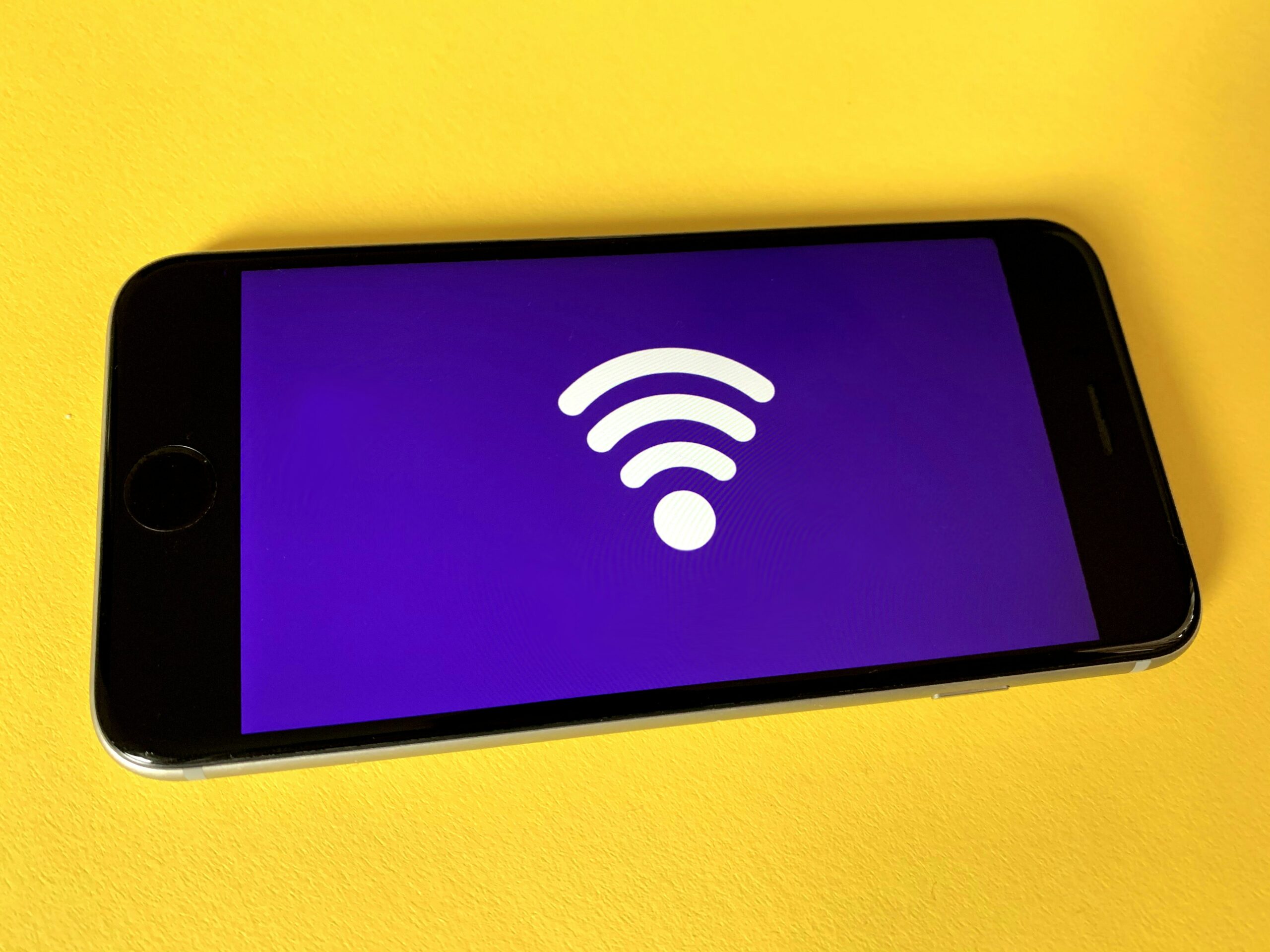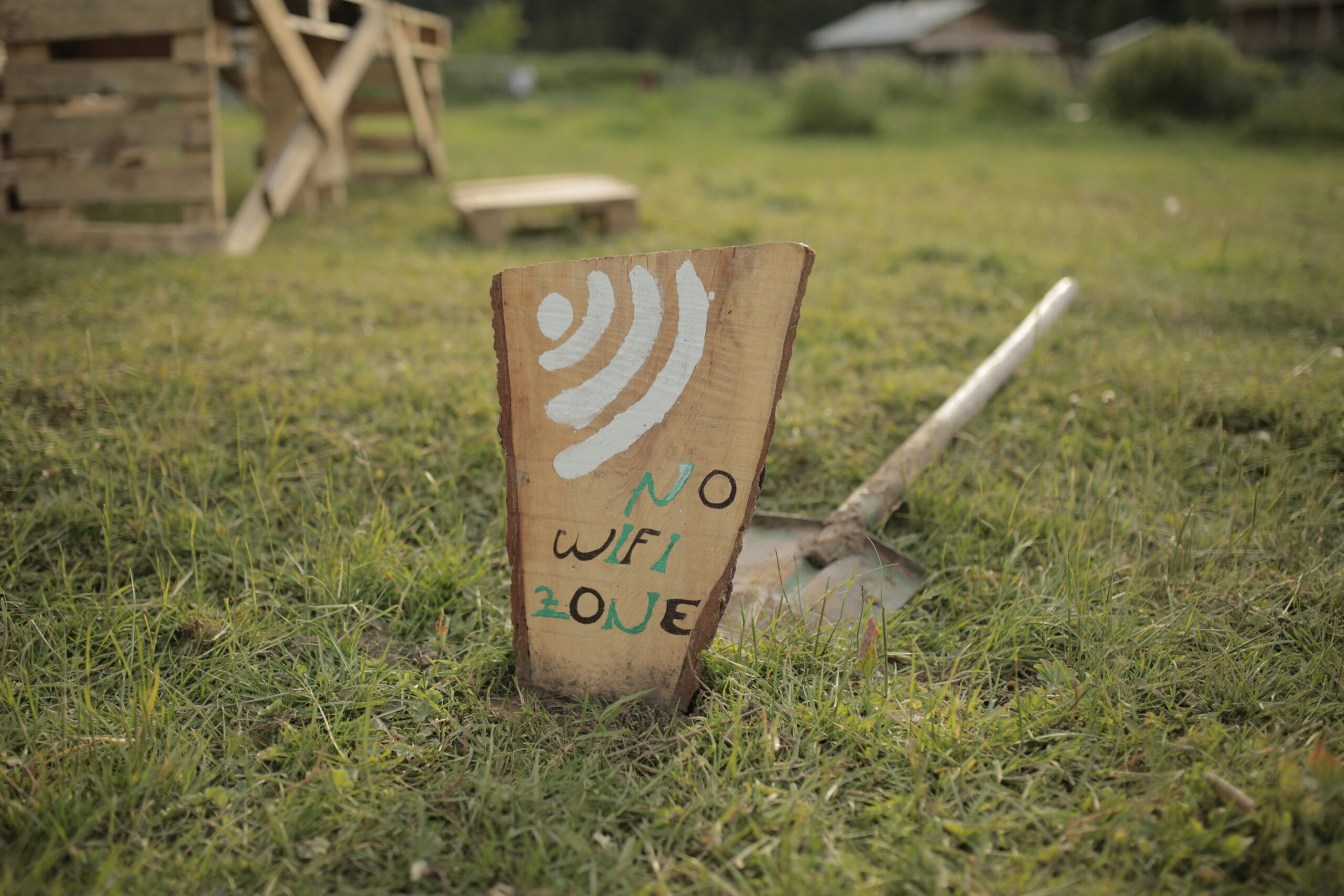
Courting has all the time include demanding situations. However the introduction of courting apps and different new applied sciences – in addition to the #MeToo motion – items a brand new set of norms and expectancies for American singles in search of informal or dedicated relationships, consistent with a contemporary Pew Analysis Middle survey.
Some 15% of U.S. adults say they’re unmarried and in search of a dedicated dating or informal dates. Amongst them, maximum say they’re disenchanted with their courting lives, consistent with the survey, which used to be performed in October 2019 – sooner than the coronavirus pandemic shook up the courting scene. Listed here are some further key findings from the learn about.
Pew Analysis Middle performed this learn about to know American citizens’ attitudes towards and private reports with courting and relationships. Those findings are in response to a survey performed Oct. 16-28, 2019, amongst 4,860 U.S. adults. This comprises those that took section as participants of the Middle’s American Traits Panel (ATP), an internet survey panel this is recruited thru nationwide, random sampling of residential addresses, in addition to respondents from the Ipsos KnowledgePanel who indicated that they establish as lesbian, homosexual or bisexual (LGB).
Recruiting ATP panelists by means of telephone or mail guarantees that just about all U.S. adults have a possibility of variety. This provides us self assurance that any pattern can constitute the entire U.S. grownup inhabitants (see our Strategies 101 explainer on random sampling). To additional make sure that every ATP survey displays a balanced cross-section of the country, the information is weighted to compare the U.S. grownup inhabitants by means of gender, race, ethnicity, partisan association, schooling and different classes.
For extra, see the document’s technique in regards to the venture. You’ll be able to additionally in finding the questions requested and the solutions the general public supplied on this topline.
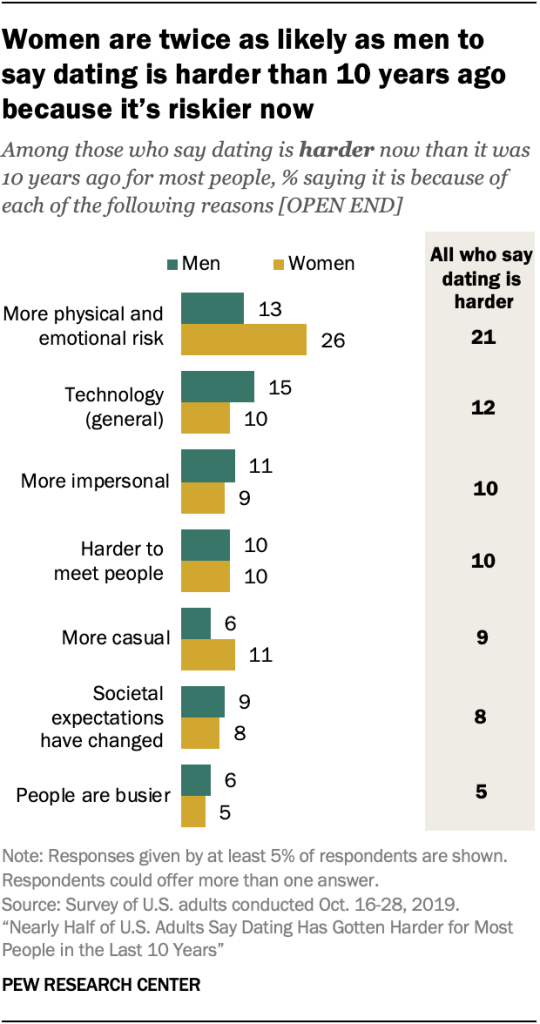
Just about part (47%) of all American citizens say courting is more difficult these days than it used to be 10 years in the past. A 3rd of adults (33%) say courting is ready the similar because it used to be a decade in the past, and 19% say it’s more uncomplicated. Girls are a lot more most likely than males to mention courting has gotten more difficult (55% vs. 39%).
Amongst those that say courting is more difficult these days, 21% suppose it’s on account of greater chance, together with bodily dangers in addition to the chance of having scammed or lied to. Girls are two times as most likely as males to quote greater chance as a reason courting is more difficult (26% vs. 13%).
Different the reason why other people suppose courting is more difficult come with generation (12%), the concept that courting has grow to be extra impersonal (10%), the extra informal nature of courting these days (9%), and converting societal expectancies, ethical or gender roles (8%).
Generation tops the record of the reason why other people suppose courting has gotten more uncomplicated within the final decade. Amongst those that say courting is more uncomplicated these days, 41% level to generation, adopted by means of 29% who say it’s more uncomplicated to satisfy other people now and 10% who cite converting gender roles and societal expectancies.
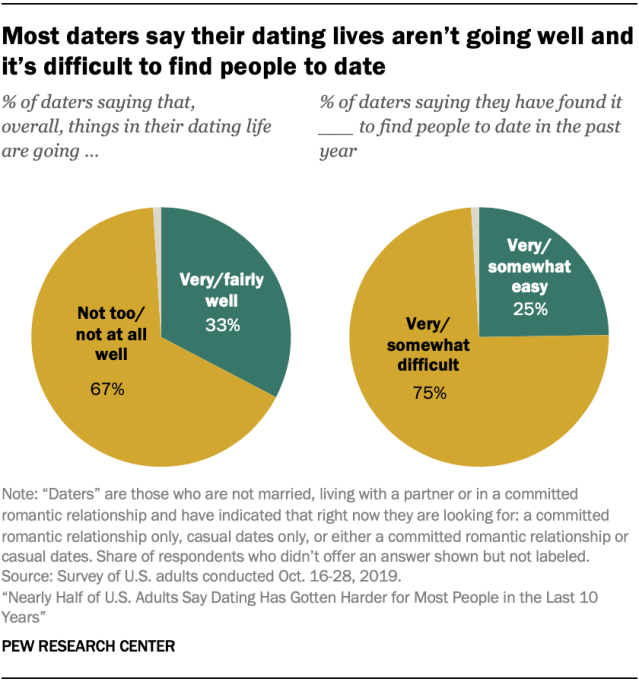
Maximum daters don’t really feel like their courting lifestyles goes neatly and say it’s been onerous to seek out other people thus far. Two-thirds of those that are unmarried and in search of a dating or dates say their courting lifestyles goes no longer too or on no account neatly (67%), whilst 33% say it’s going very or moderately neatly. Majorities of daters throughout gender, age, race and ethnicity, schooling, sexual orientation and marital historical past say their courting lifestyles isn’t going neatly.
3-quarters of daters say it’s been tough to seek out other people thus far up to now yr, consistent with the pre-coronavirus survey. A few of the most sensible causes cited are discovering any individual in search of the similar form of dating (53%), discovering it onerous to means other people (46%) and discovering any individual who meets their expectancies (43%).
Really extensive stocks of daters additionally document different hindrances, together with the restricted selection of other people of their space (37%), being too busy (34%) and other people no longer being curious about courting them (30%).
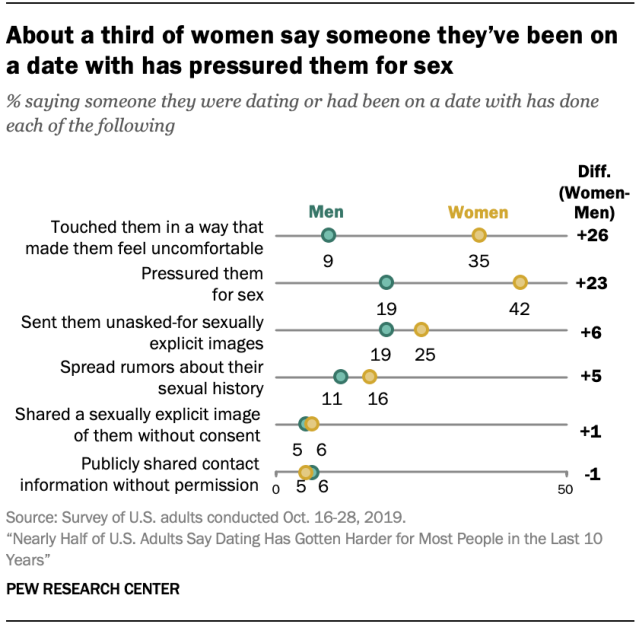
A majority (57%) of ladies – and 35% of guys – say they have got skilled some more or less harassing conduct from any individual they have been courting or were on a date with. Girls are a lot more most likely than males to mention they have got been careworn for intercourse (42% vs. 19%) or were touched in some way that made them really feel uncomfortable (35% vs. 9%). Whilst the gender hole is smaller, ladies also are much more likely than males to mention any individual they have got been on a date with despatched them undesirable sexually specific pictures or unfold rumors about their sexual historical past.
Some 42% of ladies more youthful than 40 say any individual they’ve been on a date with has despatched them undesirable sexually specific pictures, when compared with 26% of guys on this age workforce. And whilst 23% of ladies more youthful than 40 say any individual they have got been on a date with has unfold rumors about their sexual historical past, 16% of more youthful males say the similar. There is not any gender hole on those questions amongst the ones older than 40.
Many American citizens say an greater center of attention on sexual harassment and attack has muddied the waters, particularly for males, within the courting panorama. A majority of American citizens (65%) say the greater center of attention on sexual harassment and attack over the previous few years has made it more difficult for males to know the way to engage with any individual they’re on a date with. About one-in-four adults (24%) say it hasn’t made a lot of a distinction, whilst 9% say it has made issues more uncomplicated for males.
In the meantime, 43% of American citizens say the eye paid to sexual harassment and attack has made it more difficult for ladies to know the way to engage with any individual they’re on a date with, when compared with 38% who say it hasn’t made a lot of a distinction and 17% who say it’s more uncomplicated for ladies.
Males are much more likely than ladies to suppose the focal point on sexual harassment and attack has made it more difficult for males to know the way to behave on dates. Republicans and Republican-leaning independents are much more likely than Democrats and Democratic leaners to mention this. Older males also are much more likely than their more youthful opposite numbers to carry this view: 3-quarters of guys 50 and older say it’s more difficult for single-and-looking males to know the way to act, when compared with 63% of guys more youthful than 50.
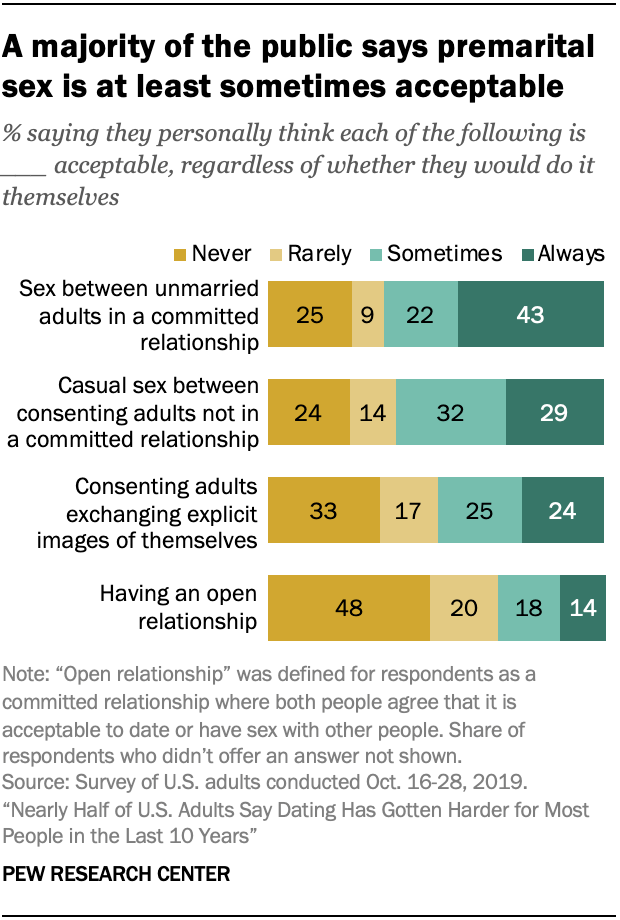
Premarital intercourse is in large part noticed as appropriate, however extra American citizens see open relationships and intercourse at the first date as taboo. Maximum adults (65%) say intercourse between single adults in a dedicated dating will also be appropriate, and about six-in-ten (62%) say informal intercourse between consenting adults who aren’t in a dedicated dating is appropriate a minimum of now and again. Whilst women and men have identical perspectives about premarital intercourse, males are a lot more most likely than ladies to seek out informal intercourse appropriate (70% vs. 55%).
American citizens are much less accepting of alternative practices. As an example, open relationships – this is, dedicated relationships the place each other people agree that it’s appropriate thus far or have intercourse with folks – are seen as by no means or infrequently appropriate by means of maximum American citizens. About part of adults (48%) say having an open dating is rarely appropriate, 20% say it’s infrequently appropriate and 32% say it’s now and again or all the time appropriate.
With regards to consenting adults sharing sexually specific pictures of themselves, about part of adults (49%) say it’s a minimum of now and again appropriate, whilst a identical proportion (50%) say it’s infrequently or by no means appropriate. Then again, there are huge age variations in perspectives of this custom. Adults ages 18 to 29 are greater than thrice as most likely as the ones 65 and older to mention that is all the time or now and again appropriate (70% vs. 21%). More youthful adults also are much more likely to mention open relationships will also be appropriate.
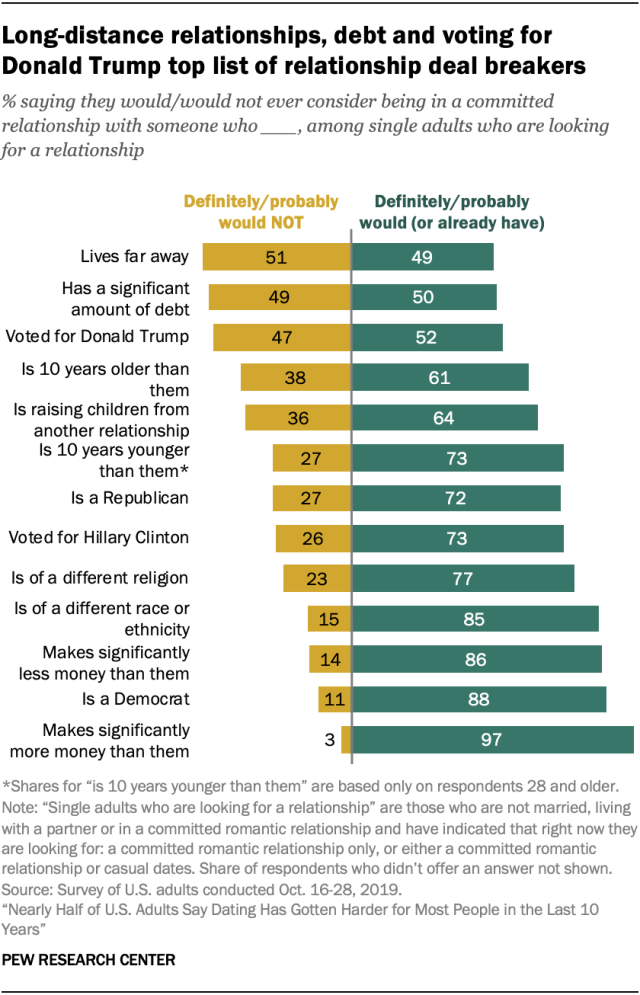
Many singles are open to courting any individual who isn’t the same as them, however sure traits would give some other people pause. Distance, debt and balloting for Donald Trump most sensible the record of causes singles in search of a dating wouldn’t believe a possible spouse, however there are different issues, too. As an example, 38% say courting any individual 10 years older than them would give them pause, and 36% say the similar about courting any individual who’s elevating kids from any other dating. A few of the ones in search of a dating additionally say they surely or most likely wouldn’t believe being in a dating with any individual who’s a Republican (27% of all daters), any individual who voted for Hillary Clinton (26%), any individual who practices a special faith (23%) or any individual who’s a special race or ethnicity (15%). Amongst daters in search of a dating who’re 28 and older, 27% say they surely or most likely wouldn’t believe a dating with any individual 10 years more youthful than them.
There are some variations in those attitudes by means of gender, political celebration and age. As an example, unmarried ladies in search of a dating are kind of thrice as most likely as males to mention they wouldn’t believe a dating with any individual who makes considerably much less cash than them (24% vs. 7%). Republicans are much more likely than Democrats to mention they most likely or surely wouldn’t believe a dedicated dating with any individual of a special race or ethnicity (21% vs. 12%). And in terms of debt, 59% of adults 40 and older say they most likely or surely wouldn’t believe a dedicated dating with any individual who has important debt, when compared with 41% of other people more youthful than 40.
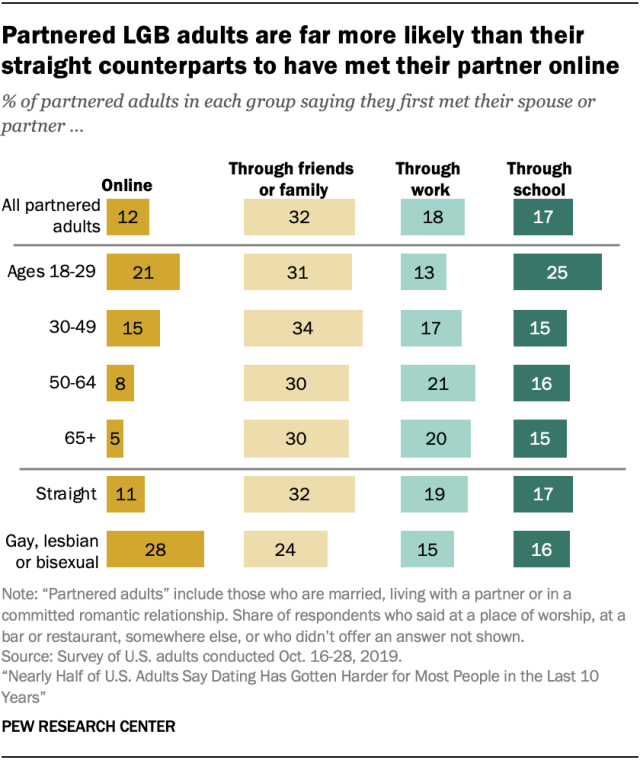
Whilst assembly companions thru non-public networks remains to be the most typical more or less creation, about one-in-ten partnered adults (12%) say they met their spouse on-line. A couple of 3rd (32%) of adults who’re married, residing with a spouse or are in a dedicated dating say family and friends helped them in finding their fit. Smaller stocks say they met thru paintings (18%), thru faculty (17%), on-line (12%), at a bar or eating place (8%), at a spot of worship (5%) or elsewhere (8%).
Assembly on-line is extra commonplace amongst more youthful adults and people who are living in city and suburban spaces, in addition to those that are lesbian, homosexual or bisexual (LGB). About one-in-five partnered adults ages 18 to 29 (21%) say they met their spouse on-line, when compared with 15% or fewer amongst their older opposite numbers. And whilst 28% of partnered LGB adults say they met their spouse on-line, 11% of those that are instantly say the similar.
Amongst those that met their spouse on-line, 61% say they met thru a courting app, whilst 21% met on a social media web page or app, 10% met on an internet dialogue discussion board, 3% met on a texting or messaging app and three% thru on-line gaming.
Part of singles say they aren’t recently in search of a dating or dates. Amongst those unmarried non-daters, 47% say a significant reason they aren’t recently in search of a dating or dates is that they’ve extra vital priorities, whilst 44% say they similar to being unmarried. Different components come with being too busy (20%), no longer having had success up to now (18%), feeling like nobody could be curious about courting them (17%), no longer being in a position thus far after dropping a partner or finishing a dating (17%), feeling too previous thus far (17%) and having well being issues that make courting tough (11%).
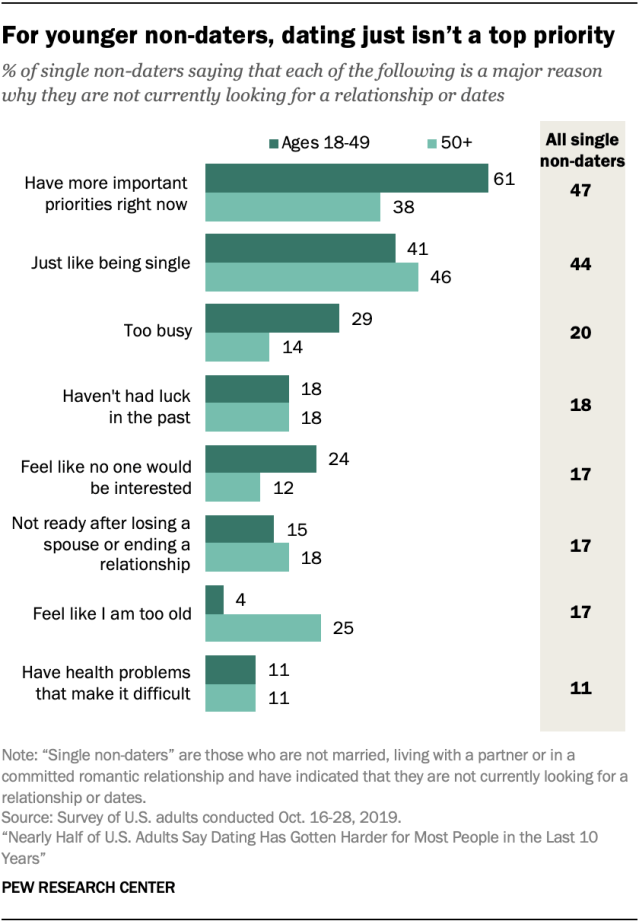
Whilst those solutions are most commonly identical for women and men, there’s one notable exception: Male non-daters are about two times as most likely as feminine non-daters to mention a significant reason why they aren’t searching thus far is the sensation that nobody could be curious about courting them (26% vs. 12%).
There may be some variation by means of age. As an example, 61% of non-daters more youthful than 50 say {that a} main reason why they aren’t searching thus far is that they’ve extra vital priorities, when compared with 38% of older non-daters. And 1 / 4 of non-daters ages 50 and older – together with 30% of the ones 65 and up – say a significant reason why is that they that really feel too previous thus far.
Word: Listed here are the questions requested for this document, at the side of responses, and its technique.

Supply Via https://www.pewresearch.org/fact-tank/2020/08/20/key-takeaways-on-americans-views-of-and-experiences-with-dating-and-relationships/
